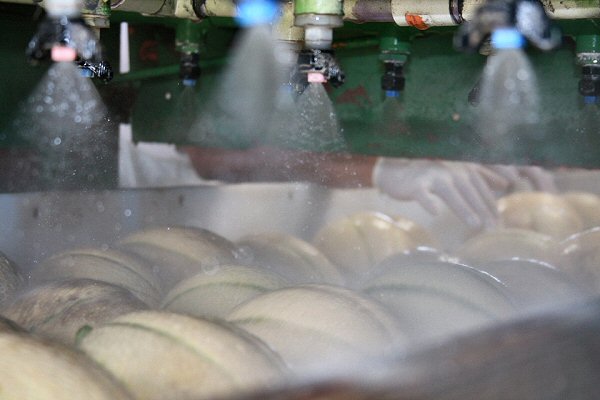UT, NC State scientists secure nearly $2 million grant to improve produce safety

Cantaloupes are among the organic crops that might benefit from post-harvest washing with naturally occurring mircrobials to prevent E. coli, Listeria and Salmonella contamination. Photo courtesy NC State University.
A group of scientists at the University of Tennessee Institute of Agriculture and North Carolina State University are working together to improve the safety of organic produce — naturally.
Their study, “Alternative Post-harvest Washing Solutions to Enhance the Microbial Safety and Quality of Organic Fresh Produce,” began last fall.
The four-year project is supported by a nearly $2 million grant from the U.S. Department of Agriculture’s Organic Agriculture Research and Extension Initiative Program. Qixin Zhong, an associate professor in the UT Department of Food Science and Technology, leads the initiative.
“The goal of the project is to provide safe, alternative, sustainable and effective treatments to reduce foodborne illnesses caused by E. coli, Listeria and Salmonella contamination in organic produce,” said Zhong.
The group hopes to provide those effective treatments in the form of alternative organic antimicrobials — naturally occurring substances such as organic essential oils that fight pathogens like E. coli — added to postharvest wash water.
“To improve the microbiological safety of organic produce, there is an urgent need to develop washing practices that not only enhance sanitation effectiveness but also fulfill the requirements of organic fresh produce,” said Zhong.
As part of the project, the researchers also will evaluate the economic feasibility of their work and impact on the shelf life of various types of organic produce.
“The research team is very eager to make sure the outcomes from this project will be applicable to organic growers throughout the United States,” said Faith Critzer, a UT Extension specialist and faculty member of the UT Department of Food Science and Technology.
To achieve that goal, researchers partnered with a group of organic produce growers who will provide feedback throughout the study. In addition, the team will share research findings through webcasts, written fact sheets and a series of workshops held in Tennessee and North Carolina.
The UT Institute of Agriculture provides instruction, research and public service through the UT College of Agricultural Sciences and Natural Resources; the UT College of Veterinary Medicine; UT AgResearch, including its system of 10 research and education centers; and UT Extension offices in every county in the state.
North Carolina State University’s project team includes an interdisciplinary group of faculty from the Plants for Human Health Institute, N.C. Cooperative Extension and the Department of Food, Bioprocessing and Nutrition Sciences, all of which are part of the university’s College of Agriculture and Life Sciences (CALS). CALS’ mission is to improve the economic, environmental and social well-being of North Carolina and the world.












